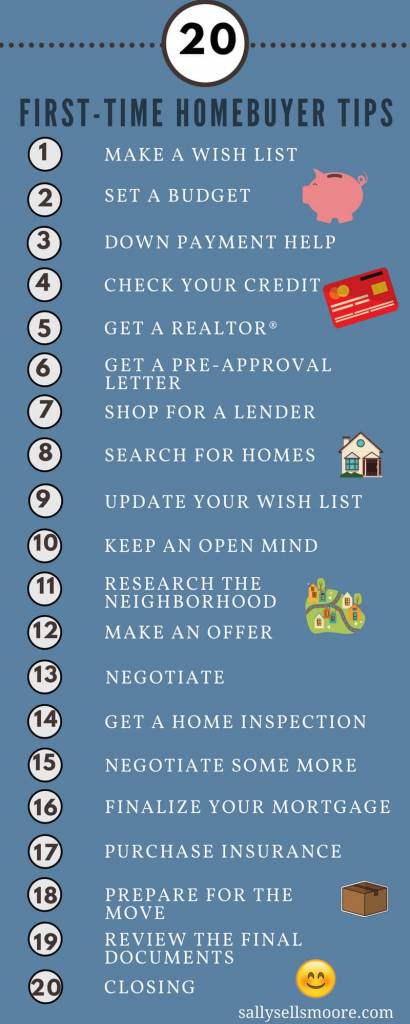You’ve fallen in love with Kansas City, like I have, and are ready to purchase a home. While that’s a feat by itself, now it’s time to figure out where to start your home search. This first-time homebuyer guide is a roadmap to buying a home in Kansas City and beyond. It includes 20 tips you need to know about buying your first home.
First-Time Homebuyer Guide
If you’ve been renting an apartment for awhile, now is the time to buy. Mortgage rates are expected to increase in 2018, so it’s better to lock in a rate before they rise. The savings add up over the life of a loan! If you’re still on the fence about buying, here’s a piece of advice from self-made millionaire David Bach. He told CNBC’s Make It that not buying a house is the No. 1 money mistake for a young person.
He went on to say, “Buying a home is the escalator to wealth in America. Homeowners are worth forty times more than renters.” – David Bach. Click here to see the source.
So, let me show you a roadmap for the home buying process, so you know what to expect along the way so your first home buying experience is stress-free!
Download FREE First-Time Homebuyer Guide

-
Make a wish list
A wish list is a great way to organize your home buying search. It’s the first step for first-time homebuyers. You can do this on your own or with a Realtor®.
Include in your list, what you like and don’t like. This includes must-have features and bonus items (things you’d love to have but aren’t a deal breaker). Also, list items you don’t want in a home. This is important because it narrows your search.
This wish list is a starting point. It’s not definitive. It can and should change during your home search. Update it as you look at homes and see home features for yourself.
With the availability of home tours online, most homebuyers think they know what they want in a home before they look. After all, they’ve been emotionally drawn to those features through virtual tours. However, a word of caution about this. Real estate photos give you a glimpse into a home. Homes often look different in person, and viewing a home in person may change your perspective on a home’s layout. That’s why you should make your wish list based on your wants and desires rather than online photos. You’ll update this list later when you look at homes in person, but consider this the beginning of your home buying roadmap.
Start your search for homes-
Set a budget
Once you know what you’re looking for, set a budget. Figure out how much you’re spending and saving each month. Are there miscellaneous expenses you can cut out of your monthly spending to save more money? Seeing where your money goes, is a powerful budgeting tool. It forces you to recognize your expenses, identify areas you can save money, and helps you achieve your goals like owning a home.
When you’re planning for a home purchase, you need to figure out how much you can afford each month. Financial guru, Dave Ramsey, suggests spending no more than 25% of your income on a home. He uses this example. If your take-home pay is $5,000 a month, multiply that by 25% to find out your maximum mortgage payment. In this case, it’s $1250 a month.
Our FREE mortgage calculator will help you crunch the numbers.
Don’t forget your monthly expenses include more than just your mortgage payment. Think about property taxes, homeowners insurance, and private mortgage insurance if you’re putting less than 20% down and not taking advantage of a down payment assistance program.
Be realistic, and don’t buy more house than you can afford. Set your own limitations rather than letting the lender set them. If you’re in Kansas City, a study by HSH, a publisher of mortgage and consumer loan information, shows you need to make roughly $44,258 to afford a home.
Your housing budget should also include extra expenses like the cost of moving, closing costs, and regular homeowner maintenance and repairs to your home.
Finally, create an emergency fund and budget for it. Even with the best home inspection, unexpected issues pop up when you own a home. When you’re a homeowner, these expenses can easily be more than your monthly budget for regular homeowner maintenance and repairs. Prepare for them by creating room in your budget to set aside money for an emergency.
There are many components to a housing budget. Spend time on it, but don’t let it overwhelm you! Remember, the goal is to stay organized so you can have a stress-free and fun home buying experience!
-
Down payment
Once you know your budget, consider how much money you’ll put down on your first home. Your down payment doesn’t have to be 20-percent. If you put down less money, you’ll pay private mortgage insurance with a conventional loan. However, there are plenty of down payment assistance programs to help you get a loan without paying PMI.
Down payment assistance programs offer lower interest rates, low or no down payments, federal tax discounts and more. Each program has its own rules, and some may have funding limitations especially on the local level. There may be residency requirements as well as income and geographic restrictions. Your Realtor will walk you through the eligibility requirements for each program.
-
Check your credit
Your credit is one factor that determines how much you’ll pay for a home loan. When you begin speaking with lenders, they’ll pull your credit score. However, you want to have a good idea of what it might be before you speak to a loan officer. That way you can fix credit reporting mistakes or blemishes on your record before you apply for a loan.
You can check your credit for free through AnnualCreditReport.com. It’s the only FREE credit check. Be suspicious of other so-called free offers.
There are three credit agencies – TransUnion, Equifax, and Experian. You can get a free report from each agency for FREE every 12 months. You can access all three through AnnualCreditReport.com. Get all the reports at once, or at any interval each year.
While the credit report won’t show you your score, it will detail all your accounts and payment history. Check it for accuracy as mistakes are common. If you find a credit error, alert the reporting agency. The Federal Trade Commission has a sample letter you can use to dispute a credit report error. If you have documentation supporting your position, include that information.
If your report is in good standing, free of delinquent accounts, your credit score will reflect it. That’s why it’s not as important that you pull your credit score. Your lender will do that for you when you start the home loan process. The credit report is indicative of your score.
Want other 8 other smart money moves?
-
Get a Realtor®
Once you have the foundation for buying your first home, it’s time to get serious. This is a good point to find a real estate agent to guide you through these next few steps.
Choose a Realtor you trust. Meet with them and decide for yourself if they’re the right fit for you.
As a first-time homebuyer, you won’t pay the Realtor fees. They’re paid by the seller so protect your biggest investment yet with a Realtor by your side.
-
Get a pre-approval letter
Fifth, get a preapproval letter. In a seller’s market, you need this before you begin searching for homes. A seller may not accept your offer without a preapproval letter.
So what is this letter? It tells the seller that your lender checked your credit and verified your financial paperwork. You’ll need lots of financial documents to get this letter. You verify your income, assets, employment, address and more.
-
Shop around for a lender
When you’re getting your pre-approval letter, talk with several lenders. While you’re not committing to a lender yet, it’s best to have a letter from a lender you feel comfortable using. Shopping around can save you thousands of dollars. It’s worth the time, and really it doesn’t take that long, to work through this step.
When you shop around for a lender, you’re comparing costs to get the loan. Fees vary by bank, and you’ll notice you may get different rates. Shopping around for the best mortgage product pays off!
Depending on your down payment, you may have fewer lender choices. Some down payment assistance programs require you use a lender that participates in that particular program. If you’re getting a conventional loan, the possibilities are endless. Consult with a variety of lenders if you can – mortgage broker, credit union, and bank (local or national).
If you want suggestions, ask your Realtor.

-
Search for homes
Congratulations! You made it this far. Now the fun part — searching for homes! Work with your Realtor to identify neighborhoods where you’d like to live. You can always add and subtract neighborhoods later.
Also, talk to your Realtor about your budget. Stay within your price range. That’s why you set a budget. Have a maximum home value in mind before you look at your first home.
Ask your Realtor to set you up on a home search or set one up yourself in seconds! This will automatically send you emails with the latest homes for sale. You can also do your own searches based on the price, address, MLS number, map view, and more.
While it’s easy to look for homes online, make sure you go to open houses and visit homes too. The more you see, the more you’ll know what appeals to you.
Search for a variety of homes – at the high and low end of your budget. This shows you what you can get for your money.
-
Update your wish list
As you’re searching for homes, your wish list may change. Perhaps you’re open to a new layout or realized your budget allows you to purchase a home with features you didn’t think you could afford.
Plus, what you think you want in a home isn’t always what you want. You may discover this halfway through the home buying process. That’s fine.
Your wish list keeps your search focused, so update it often.
-
Keep an open mind
It’s easy to get overwhelmed when you’re searching for a home, especially in a seller’s market where inventory doesn’t last long. Quick decisions are tough when it’s your first home because it’s such a big financial commitment! Be patient with yourself. You will find that home you’ve been saving for and dreaming about for years.
Consider new construction opportunities. These are a great option when there’s an inventory shortage. If you can’t find what you’re looking for on the resale market or for the price you want, build it! With new construction, you can build from scratch, put the finishing touches on a home in progress, or purchase a model home. We have new construction lots in Stone Canyon of Blue Springs, Sonora Valley, Brittany Ridge, and Rosewood Hills. Some of these homes are more affordable than you think. You can get a new construction home in Grain Valley or Kansas City starting in the low $200’s.
When you’re looking at homes online, be open to different layouts and neighborhoods. Don’t overlook a home with poor online photos or a home that appears to be a fixer-upper. Bounce ideas off your Realtor. Keep an open mind. Sometimes there really is a diamond in the rough.
When you’re open to the possibilities in a home, you’ll see it in a different light.
As a Professional Home Stager and former house flipper, I see the potential in homes that need a little work. My vision for design and rehab can help you decide if it’s a money pit or a valuable fixer-upper.
-
Research the neighborhood
Once you find a potential first home, research the neighborhood. Talk with would-be neighbors and visit the community during the day and at night. You’ll see the area in a different light.
Researching a neighborhood also includes checking the cost of living there. While there are cost of living calculators for cities, it’s harder to find one for a neighborhood. But, it really does matter.
For example, car insurance varies by zip code. So, as part of your research, call an insurance agent and get quotes for auto and home insurance before you commit to a neighborhood. The neighborhood you choose could cost a few hundred dollars a year more than another one. Understanding these costs ahead of time, helps you stick to your budget when you’re making an offer.
While most suburban communities are safe, crime happens everywhere. It’s more prevalent in some neighborhoods than others. Many cities, including Blue Springs and Lee’s Summit offer free crime mapping tools so you can pinpoint the areas where the most crime happens. Vigilance is important.
Take your time to make sure it’s the right choice. There’s a lot of pressure in a seller’s market to make an offer quick. It’s a reality of buying a home now, but don’t let it get to you. If you wait a few days to make an offer, it’s probably too late. However, it’s perfectly fine to take a few hours or even a day, to make your decision.
If your home search takes longer than expected, use the extra time to do some of the research ahead of time. Research potential neighborhoods early on rather than waiting until you’re ready to make an offer.
-
Make an offer
When you know you’ve found your first home, make an offer. Your real estate agent will run what are known as “comps” for the neighborhood. These are comparable home sales. Use these as a guide to make your offer.
Consider if you’re going to ask for closing costs or an allowance for home improvements. Include these in your offer, along with your pre-approval letter.
-
Negotiate
Once you make an offer, the waiting game begins. It’s the hardest part of the home buying process. Prepare for a counteroffer, and an ensuing negotiation. It’s part of the process.
While you’re waiting, look at your budget and remind yourself of the maximum price you’ll pay for a home. Having this number in mind before you receive the counter offer, allows you to look at it objectively. It helps you make a rational rather than emotional decision.
Buying a home is an emotional process. That emotional connection is what drives you to make an offer. So, by this point, you want your offer accepted. A counteroffer that’s out of your price range is the last thing you want to hear. However, it’s not the end of the world. You can make a counteroffer. Negotiation is a process.
Just, stick to your budget!
-
Get a home inspection
Congratulations! The seller accepted your offer and you’re on your way to buying your first home. Now, it’s time for an inspection. This is an important part of the home buying process, because it clues you into potential problems with the home.
First, make sure you hire a qualified home inspector. These are terrific questions to ask him, so you know your potential investment is protected.
Second, understand what type of inspection you’re getting. In Kansas City, termites and radon are inspections we recommend. Your home inspector may or may not offer this service. That’s why you need to make sure you’re asking the right questions, and understand what’s included in the home inspection.
Think of the inspector as your personal detective. Nobody wants him to find anything wrong with the house they want to buy, but it’s important the inspector find the problems before you move in. That way you can ask the seller to help with some of the repairs and you can prepare for others.
-
Negotiate some more
Now that you know what needs work in the home, it’s time to negotiate some more. Make a counteroffer, asking the homeowner to fix some of the items that came up during the inspection.
In a competitive market, you probably won’t get everything you ask the owner to fix. Critical safety issues are hard to ignore, so put those on your list. The other items are up for negotiation. Talk to your Realtor® about this, as they’re master negotiators!
-
Finalize your mortgage with the bank
Once the negotiation is over, you’re well on your way to buying a home. Now, it’s all about the paperwork. There’s lots of it!
Electronic signatures make it easy to navigate the paperwork. Expect frequent emails, though, requiring your signature.
You’ll get a loan estimate that details important information about your loan. Make sure it includes the details of your loan that you discussed with your lender. Look at your rate, loan terms, estimated monthly payment, and escrow costs. Plus, look to see if there’s a prepayment penalty. The Consumer Financial Protection Bureau, a government agency working on consumer financial interests, shows you what a sample loan estimate looks like so you know what to expect.
When you’re looking at these documents, check for mistakes. Human error and typos happen. You want to catch these before closing.
You’ll work with the bank and title company to finalize the paperwork and prepare for closing.
-
Purchase insurance
Your bank will need your homeowner’s insurance policy to process your loan. Most lenders create an escrow account for you, which automatically pays your insurance and property taxes each year. Your monthly mortgage payment includes the loan and your escrow payment.
If you got insurance quotes when you were researching the neighborhood, call the agents back and finalize the numbers.
If you’re starting from scratch, call several agents to get quotes. Some insurance agents represent one company and others work with multiple carriers. Get at least three quotes. Like your loan, you want to shop around for insurance to find the most competitive rate.
Since this is your first time buying a homeowners insurance policy, sit down with your agent and talk through the policy. It’s a more detailed policy than renter’s insurance, so you want to understand all the nuances in case you have a loss.
In Kansas City, hail is your biggest threat. Understand how your policy works if you file a claim.

-
Prepare for the move
Now that you have a little break, other than signing your life away every few days, it’s time to prepare for the move. Talk with several movers, and get quotes from at least three.
For an accurate quote, have the moving company visit your apartment, rental unit, or current space to look at the number of items they’re moving. Otherwise, you may find yourself going over budget on moving day. Nobody wants that surprise!
Moving insurance is often overlooked, but it’s probably one of the most important things. If you don’t get it, you’ll get pennies on the dollar for expensive items. Damage happens during moves, so you need to prepare for it. If you lose something valuable, the value is based on its weight unless you have insurance.
For example, a $1000 computer may be worth just $20 because they don’t weigh much. Consider moving insurance. It’s not that expensive and it’s worth it.
If you’re moving pets, prepare them ahead of time. They sense something is changing, and you want to make sure you prepare your pets for the move!
-
Review the final documents
At least three days before closing, you’ll receive the closing disclosure. It lists the final terms of your loan, closing costs, and who receives and pays money at closing. Compare this form to your loan estimate. The loan term, product, and amount should match your estimate. The CFPB shows you a sample closing disclosure form.
Right before closing, you’ll also receive a settlement statement. This includes the financial details of the home purchase including the down payment, loan amount, closing costs, and any other fees or credits to the buyer and seller to finalize the purchase.
-
Closing
Your big day is finally here! Prepare to sign your life away for about 30-60 minutes. Real estate disclosures are more consumer-friendly than ever before, so it’s easier than ever to understand what you’re signing. Read the documents before you sign, so you understand what you’re agreeing to.
Once that’s done, enjoy your new home! It’s a great financial decision, and you’ll make years of wonderful memories in your new house! Congratulations!
damn




 3751 NE Ralph Powell Road
3751 NE Ralph Powell Road 

